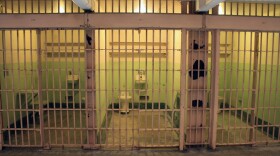For the past few years, a campaign has been building to change how Michigan handles 17-year-olds who commit crimes.
As it stands now, those 17-year-olds are automatically charged as adults, and – when convicted – sent to adult prisons.
Advocates say Michigan is one of only seven states in the nation that still do this. And, in the next few weeks, they’re hoping to finally push through a law to change it.
The law already has a lot to say about turning 18. That’s the age you can vote, the age you can join the military, and buy a pack of cigarettes.
"The majority of these 17-year-olds were there for nonviolent, non-weapon related offenses," says Kristen Staley of the Michigan Council on Crime and Delinquency. "Over half of them had no prior juvenile record."
But in Michigan, if you commit a crime, the age that matters for you is 17, not 18.
"On your 17th birthday, you are no longer considered a child in the eyes of the justice system," says Kristen Staley, deputy director of the Michigan Council on Crime and Delinquency. The group has been working now for years to get the state to raise the age at which people can be charged as adults in the state. That work included publishing a study two years ago titled Youth Behind Bars. The study found that more than 20,000 juveniles had been sentenced as adults in Michigan, most of them 17-year-olds
"The majority of these 17-year-olds were there for nonviolent, non-weapon related offenses," Staley says. "Over half of them had no prior juvenile record."
And the report found the adult prison system was particularly bad for these 17-year-olds. They were more likely to be sexually assaulted, more likely to commit suicide, and more likely to commit crime again after they’d been released.
With this report, a coalition began to build to change the law in Michigan, so that 17-year-olds wouldn’t automatically be sent to adult prison. In March, a package of bills passed the state House with both Republican and Democratic support.
Last week, the bills had their first hearing in the state Senate.
"We are in support of the concept and the rehabilitative notion that all of this embodies," said Judge Dorene Allen of Midland County during testimony. But Allen opposes the legislation because she says counties have more responsibilities in juvenile courts. So, switching 17-year-olds to those courts will cost counties money. Money that they don’t have.
"This would be a catastrophe for the counties and for the courts," Allen testified.
Earlier this week, I met with someone who has firsthand experience with the current policy.
"We have to get these children out of the prison system right now," Jamie Rykse told me.
Today, Rykse runs a GED program at Heartside Ministry in Grand Rapids. But when she was 17, she was sentenced as an adult and sent to adult prison for a home invasion. She said she’d been living on the streets hungry, abused, and scared since she was 14.
"Before I went to prison, I had been through so much," Rykse says. "I had been through hell and back. I know I did something bad. I shouldn’t have did it. But I needed help."
Instead, she went to prison where she said younger inmates were preyed upon by older, more violent inmates. She says she saw teenagers like herself getting in “relationships” with adult inmates – to this day she considers it pedophilia, sanctioned by state prison policy.
"You're surrounded by prison guards with guns pointed at you. And you're a child? And this is supposed to help a child? A non-violent offender? It don't."
She says what many experts now say, that young minds are still developing at age 17. Whatever you grow up with, that’s what’s normal to you. Grow up around people who care, in a loving home, that’s what you learn to be.
"And it’s the same thing in prison," Rykse says, "except you’re surrounded by barbed wire, three fences worth of barbed wire. You’re surrounded by prison guards with guns pointed at you. And you’re a child? And this is supposed to help a child? A non-violent offender? It don’t."
The campaign to raise the age at which people can be charged as adults has been a national one. Michigan is one of only seven states left that still routinely sentence 17-year-olds to adult prisons.
Whether that changes will all depend on what happens over the next several weeks in Lansing.






